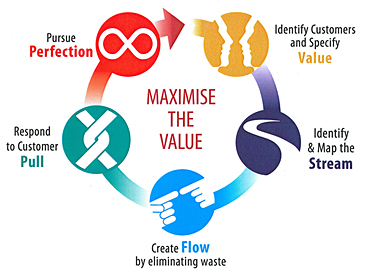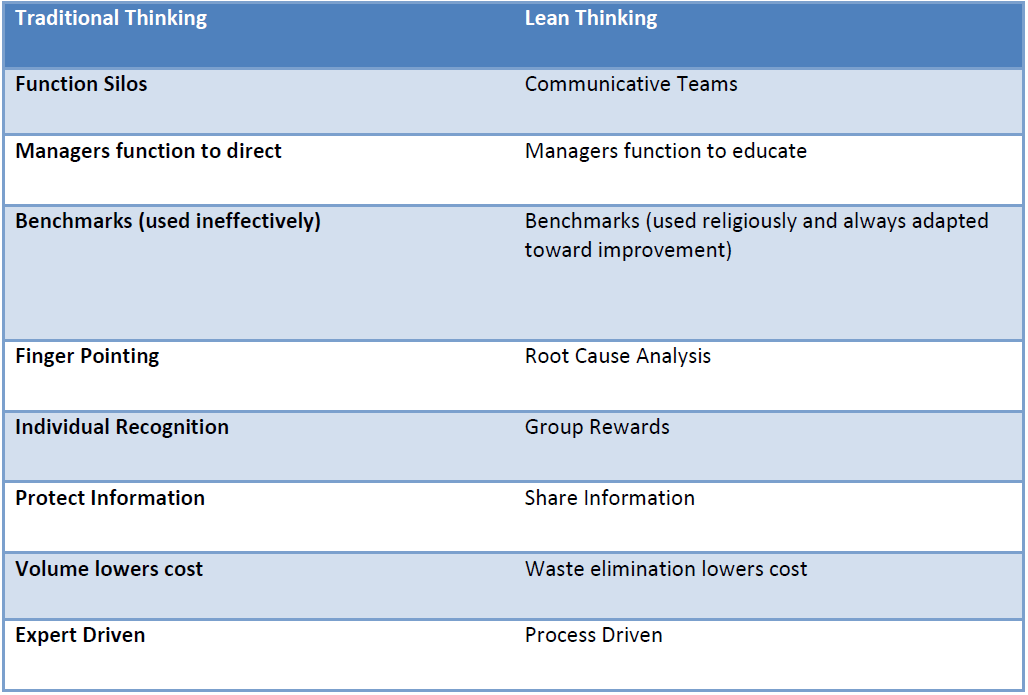Lean Thinking For Healthcare
 With the advent of the highly controversial and experimental Affordable Care Act physicians and healthcare organizations are looking for innovative ways to boost efficiency within the healthcare system so that quality improves while cost savings are achieved. As part of this initiative, more and more healthcare organizations are turning to “lean thinking” a pioneering way to boost productivity which has been around for a while, and has been applied to the manufacturing industry with great success. Today we will explore the principles of “lean thinking” including what it is, how it originated, and how healthcare is beginning to incorporate these lean thinking principles to bring about change.
With the advent of the highly controversial and experimental Affordable Care Act physicians and healthcare organizations are looking for innovative ways to boost efficiency within the healthcare system so that quality improves while cost savings are achieved. As part of this initiative, more and more healthcare organizations are turning to “lean thinking” a pioneering way to boost productivity which has been around for a while, and has been applied to the manufacturing industry with great success. Today we will explore the principles of “lean thinking” including what it is, how it originated, and how healthcare is beginning to incorporate these lean thinking principles to bring about change.
What is Lean Thinking?
Lean thinking, put simply, is a philosophy, set of principles, and tools based on the principles of the Toyota Production System and focused on understanding and eliminating waste. Several critical components are addressed according to the principles, which work equally well in the healthcare and manufacturing industry and include:
- stabilizing work loads
- standardizing the way work is conducted
- identifying and solving problems
- making process improvement inherent throughout the entire organization, involving everyone
- focusing on effectiveness rather than functional efficiency
Applying the concept of Lean Thinking includes identifying both waste and value, it is important to note that value in healthcare is judged both by the patient (what they believe is valuable) and what is identified as providing the optimal patient outcomes. The underlying goal is to continually strive to create value and optimize value added activities, while working to eliminate those functions which have no value, and thus only add cost.
Lean is more about an organizational, cultural, philosophical rethinking than about tools utilized to make work easier.
Four Keys to Lean Healthcare Success
For organizations to appropriately apply lean thinking the following four key principles are critical:
1. Define Processes and Continually Improve Upon Them – Lean thinking in healthcare standardizes the way in which everything is done, and utilizes data, measurement, and continuous quality improvement to drive the value of these processes. In lean healthcare the definition of perfection should always be fluid, and once one metric is reaches another goals should be set.
2. Organizational Buy-In – Organizations who explore lean thinking will need to undergo what amounts to a significant cultural change for many. They must let go of preconceived notions of what works, and why they do some things the way that they do so that improvements for the future can be identified. Above all, they must trust in the lean process and that it will garner the results they are looking for.
3. Engagement Cannot Be Top Down or Bottom Up – Engagement in true applications of lean thinking are not top down, nor bottom up, but pervasive throughout the entire organization. It is important to understand each task from multiple perspectives, and a hallmark of lean thinking is accepting input from members of the organization at every level to bring about both small and dramatic change.
4. The Process Must Never End – True lean thinking is not satisfied when a goal has been met. The application of consistent lean thinking will push past and aim for improvement on the initial goal, or set another goal.
Understanding the Lean Thinking Cultural Shift
As stated, lean thinking in healthcare requires a significant cultural shift in order to be effective:

The Future of Lean Thinking in Healthcare
As we previously mentioned, lean thinking in healthcare has been around for some time, but has not been widely and consistently applied. The good news is that in cases where it was successfully implemented organizations have established large financial savings and gains in efficiency. We predict that as healthcare reform begins to settle, and as large healthcare delivery systems and providers begin looking for ever increasing ways to improve outcomes and decrease healthcare cost, that lean thinking will surge to the forefront as one methodology which can be utilized to help address cost containment issues, and we believe that lean thinking in healthcare is a philosophy that we will be hearing much more about in the years to come.





